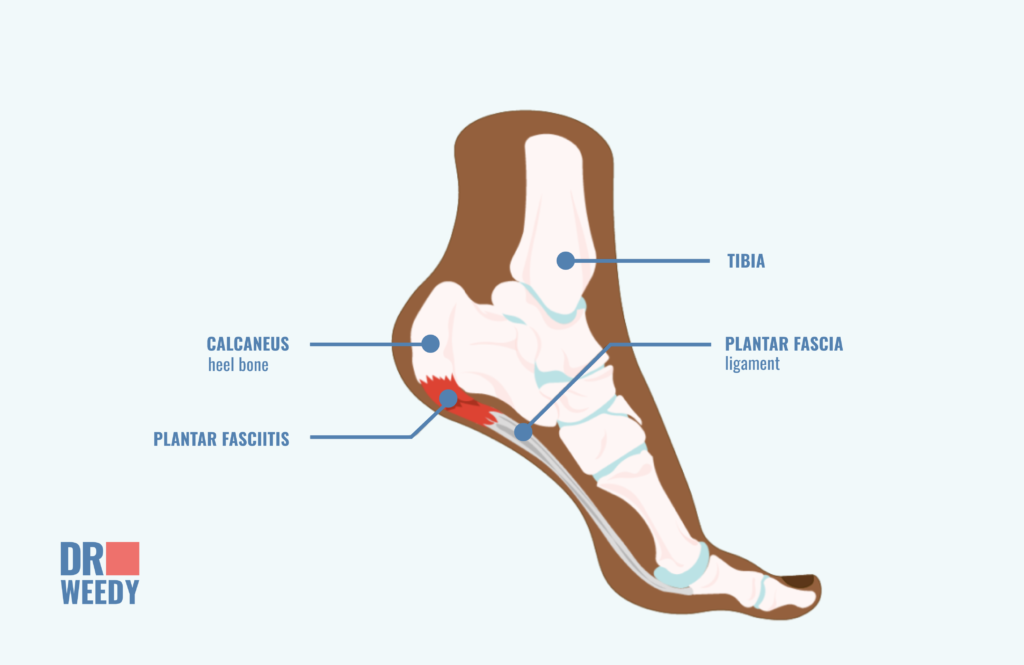How to Use CBD Oil to Relieve Plantar Fasciitis: Is CBD Effective?

If you’re suffering from the nagging pain of Plantar fasciitis, you know how debilitating it can be. It turns walking into a chore, while every step feels like a sharp stab in the heel.
Plantar Fasciitis is a common condition that affects many people, causing serious pain, discomfort, and limited mobility. If you are wondering if CBD oil is an effective treatment option, this article is for you. The good news is that CBD oil can help! But how do you use it? Keep reading to learn all about using CBD oil to relieve plantar fasciitis. We will show you the benefits to expect and how it can help alleviate the symptoms.
What is Plantar Fasciitis?

Plantar Fasciitis is a condition that affects the Plantar Fascia, which is a thick band of tissue that runs across the bottom of the foot. When this tissue becomes inflamed or irritated, it can cause pain and discomfort.
Plantar Fasciitis is often caused by overuse or repetitive strain on the foot, and it is commonly experienced by athletes, runners, and people who spend a lot of time on their feet. Therefore, professional runners and dancers as well as people who lead an inactive lifestyle, have sedentary work, and wear uncomfortable shoes are at high risk of getting this disease. The inflammation not only brings discomfort and pain but also can cause the development of other diseases.
Is Plantar Fasciitis Curable?

Plantar Fasciitis is a condition that can be managed, and with the right treatment and self-care, most individuals can expect significant improvement and eventual resolution of their symptoms within one year. Common Treatment options include rest, ice, stretching, and physical therapy. In some cases, surgery may be necessary to alleviate the symptoms.
There are also alternative treatments available, such as CBD oil, that can be effective in managing the symptoms of Plantar Fasciitis. The healing qualities of CBD are scientifically proven in modern medicine, providing hope for even complex medical conditions. It is non-invasive and does not result in irreversible effects.
So What Are the Benefits of CBD for Plantar Fasciitis?

CBD, short for cannabidiol, is a non-psychoactive compound found in the cannabis plant. It is renowned as an excellent pain relief, amongst other therapeutic benefits, including its ability to reduce inflammation.
Generally, you can expect the following potential benefits when using CBD to treat plantar fasciitis:
1. Pain Relief
CBD interacts with the endocannabinoid system in the body, which plays a role in regulating pain perception to relieve chronic pain. By reducing pain signals, CBD may help alleviate the discomfort associated with plantar fasciitis.
2. Anti-Inflammatory Properties
CBD possesses anti-inflammatory properties that can help to reduce the swelling and pain associated with plantar fasciitis. Clinical studies have shown that CBD can reduce the levels of pro-inflammatory cytokines, which are molecules that promote inflammation and also induce T-cell apoptosis. These mechanisms will help your body fight the condition better.
3. Muscle Relaxation
CBD has muscle-relaxing properties, which can be beneficial for those with plantar fasciitis as it may help ease tension in the foot and calf muscles.
Plantar fasciitis results in an altered gait pattern which in turn, can cause strain on the muscles, ligaments, or joints in the rest of your leg. It can proceed to induce severe pain in the leg and back muscles, but CBD oil muscle relaxing ability may help with this.
4. Improved Sleep
Sleep deprivation causes stress, which can affect wound healing. A Study of 5-HT1A in 2008 showed that CBD is capable of reducing stress. This implies that oral CBD may promote better sleep quality, which is essential for the healing process. CBD also improves blood circulation.
Unlike some conventional pain medications, CBD is generally well-tolerated without serious adverse effects, making it a safer option for long-term use.
How Does CBD Oil Work For Treating Plantar fasciitis?

CBD oil works by interacting with the body’s endocannabinoid system (ECS). When taken orally, cannabidiol (CBD) is broken down by enzymes in the liver and then absorbed into the bloodstream. Once in the bloodstream, CBD binds to receptors in the ECS, which is a network of receptors found throughout the body that play a role in regulating pain, inflammation, and other bodily functions. Activation of these receptors by CBD can lead to reduced inflammation and pain relief.
It is important to note that the dosage of CBD depends on the individual’s weight and desired effects. A good starting point is 1-6 mg of CBD per 5 kg (11 lb) of body weight. It is important to start with a low dose and gradually increase it until the desired effects are achieved.
Topical CBD oil is also safe and effective for most people. However, it is always a good idea to consult with a healthcare professional before using any new medication, including CBD. This is especially important if you are taking other medications, as CBD can interact with some drugs.
How to use CBD for Plantar Fasciitis

There are several ways to use CBD oil for Plantar Fasciitis. Here are four options:
1. CBD Oil Drops and Edibles
These provide both targeted and generalized effects to relieve Plantar fasciitis and promote healing.
2. CBD Topicals and Tinctures
CBD topical creams and tinctures can be applied directly to the affected area to provide localized relief. They are quickly absorbed to provide quick, targeted relief.
3. Transdermal CBD Patches
Transdermal CBD patches are another option for people with Plantar Fasciitis. These patches are placed directly on the skin and can provide long-lasting relief throughout the day.
4. CBD Infused Insoles
CBD-infused insoles can be placed in your shoes to provide continuous relief throughout the day. These insoles are infused with CBD oil and can help reduce inflammation and pain.
By implementing any of these strategies, people have found relief. You could be the next.
Risk Factors For Developing Plantar Fasciitis

There are several risk factors for developing Plantar Fasciitis, including:
- Age
- Obesity
- Overuse or repetitive strain
- Flat feet or high arches
- Tight calf muscles
If you are at risk of developing Plantar Fasciitis, it is important to take preventative measures to avoid the condition.
Final Thoughts
CBD oil can be an effective treatment option for people with Plantar Fasciitis. The key benefit of CBD oil is that it doesn’t create euphoric and psychotropic effects since it does not contain THC. Altogether, CBD is natural, affordable, safe, and very valuable for medical purposes.
So, if you are struggling with Plantar Fasciitis, consider trying CBD oil today, as a natural, alternative treatment option. Stay well.
Sources:
- Atalay, S., Jarocka-Karpowicz, I., & Skrzydlewska, E. (2019). Antioxidative and Anti-Inflammatory Properties of Cannabidiol. Antioxidants, 9(1). https://doi.org/10.3390/antiox9010021
- Benjamin K. Buchanan, Donald Kushner “Plantar Fasciitis” May 30, 2022.
- Mostaghimi L, Obermeyer WH, Ballamudi B, Martinez-Gonzalez D, Benca RM. Effects of sleep deprivation on wound healing. J Sleep Res. 2005 Sep;14(3):213-9. doi: 10.1111/j.1365-2869.2005.00455.x. PMID: 16120095. Resstel, L. B., Tavares, R. F., Lisboa, S. F., Joca, S. R., Corrêa, F. M., & Guimarães, F. S. (2008). 5-HT1A receptors are involved in the cannabidiol-induced attenuation of behavioural and cardiovascular responses to acute restraint stress in rats. British Journal of Pharmacology, 156(1), 181-188. https://doi.org/10.1111/j.1476-5381.2008.00046.x
- Schilling, J. M., Hughes, C. G., Wallace, M. S., Sexton, M., Backonja, M., & Moeller-Bertram, T. (2021). Cannabidiol as a Treatment for Chronic Pain: A Survey of Patients’ Perspectives and Attitudes. Journal of Pain Research, 14, 1241-1250. https://doi.org/10.2147/JPR.S278718



























As a sufferer of plantar fasciitis i am looking for anything that will help with the pain.
the post was very informative and up to yet nobody is tying o sell me anything.